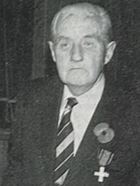Francis Jayne, who died in November, had been in bad health, which he fought with great courage, for more than two years.

He was born in 1903 and educated at Rugby and Oxford University, joining the 7th Hussars at Tidworth in 1925. While at Oxford he had been a pupil of Charlie Kelly who trained a few horses at Bicester and was always willing to help young men who were keen to ride races. This soon became his main interest in the horse world, and he would always accept a ride on any horse, however moderate.
He had a quick brain and a lively sense of humour and was at all times a gay and amusing companion. As a result, he was very popular in the Regiment and had a wide circle of friends outside it. In 1929 he went on a 2-year attachment to the Transjordan Frontiers Force, and, later, was away for eighteen months as Assistant Military Secretary in Lisbon. On his return, early in 1937, he found mechanisation in full swing.
After a spell in command of R.H.Q. Squadron he took over ‘C” Squadron which he commanded in the Western Desert from May 1940 till after the Battle of Mechili in February 1941. Here he was awarded an immediate D.S.O., seldom given to a Major, for his gallantry in action against a greatly superior force of Italian medium tanks.
For the few remaining weeks of the campaign, he was Second-in-Command of the Regiment and was then sent on a lecture tour of factories in the United Kingdom and America, a task for which he was very well suited. On his return, he became Second-in-Command of the Regiment when it returned from Burma.
Early in 1943, he succeeded in commanding the Regiment when it moved back to the Middle East and took it to Italy a year later. Here it supported the Polish Corps during some very hard fighting in the Adriatic Sector which was a bad country for tanks and established a friendship which has lasted
till the present day.
He was awarded a bar to his D.S.O. for his leadership of the Regiment in Italy, very few can have won this medal Commanding both their own Regiment and a Squadron in it.
He went home late in 1944, and, after a spell in command of an O.C.T.U., returned to command the Regiment for 3 years from 1946-1949. It was successively in Italy and Germany and later at Barnard Castle when he retired.
Later he lived in Portugal for some years, returning to make his home near Devizes.
Francis was first and foremost a Regimental Officer, intensely loyal to the 7th Hussars, and, later, The Queen’s Own Hussars. Right up to his death he attended, regularly, Regimental functions, and he will be very much missed by his many friends.
Our deepest sympathy goes to his widow and daughter.


